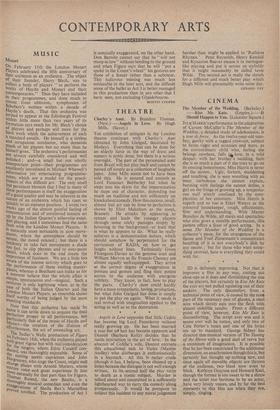THEATRE
Charley's Aunt. By Brandon Thomas. (New.)—Angels in Love. By Hugh Mills. (Savoy.) THE exhibition of antiques in the London theatre continues with Charley's Aunt (directed by John Gielgud, decorated by Motley). Everything that can be done for an elderly farce in the way of dress and scenery is nobly done, but there is a serious oversight. The part of the personated aunt from Brazil will not play itself and cannot be passed off simply as a collection of laughable japes. John Mills seems not to have been told this. He is assured and smooth as Lord Fancourt Babberley but when he, steps into his skirts for the impersonation he steps out of character, depending too much on tradition and not sufficiently on knockabout comedy. How this curious, small, almost lost art can be done to perfection is shown by Eliot Makeham as the scout, Brassett. He attacks by appearing to retreat and leads the younger players through some sticky passages simply by hovering in the background—at least that is what he appears to do. What he really achieves is a demonstration lecture, which should somehow be perpetuated for the curriculum of RADA, on how to get laughs without lines. Technically Gwen Ffrangcon-Davies as the genuine aunt and William Mervyn as Sir Francis.Chesney are almost equally well-equipped. They arrive at the correct degree of exaggeration in posture and gesture and fling their points across to the audience with energetic subtlety. They know, in fact, how to play the parts. Charley's Aunt could hardly have a more sympathetic, loving, production, but what John Gielgud has done is simply to put the play on again. What it needs is real revival with imagination applied to the acting as well as to the decoration.
Angels in Love supposes that little Cedric has become big Lord Fauntleroy without really growing up. He has been married a year but nd heir has become apparent and Dearest (Barbara Kelly) decides that he needs instruction in the art of love. In the absence of Ceddie's wife, Dearest entrusts this educational task to Violet (Maxine Audley) who discharges it enthusiastically in a haystack. All this is rather crude (though it has, I believe, been cleaned up a little) because the dialogue is not well enough written. In its second half the play turns to death as a comic subject. Murder is talked about and committed in a sufficiently lighthearted way to carry the comedy along prosperously. It would . be pompous to subject this incident to any moral judgement harsher than might be applied to 'Ruthless Rhymes.' Peter Reynolds, Henry Kendall and Kynaston Reeves encase it in meringue- like playing and put it across so stylishly that it might reasonably be called tame Wilde. The second act is really the sketch for a different and much better play which Hugh Mills will presumably write some day.
GERARD FAY


































 Previous page
Previous page